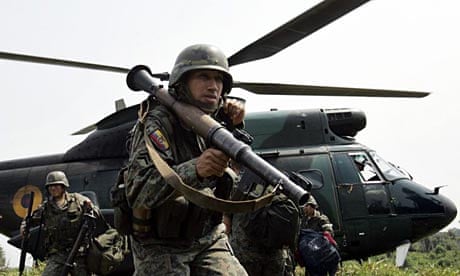Venezuelan and Ecuadorean troops deployed on Colombia's frontier last night as South America's military and diplomatic crisis escalated into a dangerous showdown between President Hugo Chávez and Colombia's US-backed government.
Venezuela started shutting crossing points on the 1,400-mile border to try to isolate its neighbour after Bogotá made a series of extraordinary allegations about the Venezuelan leader funding Marxist guerrillas intent on building a uranium-enriched "dirty" bomb.
"Colombia proposes to denounce Hugo Chávez, president of Venezuela, in the international criminal court for sponsoring and financing genocide," said President Alvaro Uribe.
The Organisation of American States, a pan-regional body, held an emergency meeting in Washington to seek a diplomatic solution after President George Bush sided with Colombia, his administration's key ally in Latin America. The US president accused Venezuela of "provocative manoeuvres" and said he stood by Bogotá and its fight against terrorism. He also urged Congress to approve a free-trade agreement with Colombia.
Pictures of Venezuelan trucks and tanks rolling west, the vanguard of 10 battalions which were ordered to mobilise, and of Ecuadorean troops moving to the Colombian frontier from the other side of the Andes, underlined the risk of South America enduring its first war in over a decade. Quito and Caracas have severed diplomatic ties with their neighbour.
"A serious cross-border military conflict is unlikely [but] the chain of actions and reactions often has a life of its own. There is no telling where it could lead," said Michael Shifter, of the Inter-American Dialogue thinktank.
Colombia triggered the crisis last Saturday by bombing a rebel camp one mile inside Ecuador, killing at least 21 members of the Revolutionary Armed Forces of Colombia (Farc), including a senior commander, Raul Reyes.
The Marxist group, which has been waging an insurgency against the Colombian state for decades, said yesterday the raid gravely damaged chances of further releases of some of the 700 hostages it holds in jungle camps, including Ingrid Betancourt, the ailing Franco-Colombian politician who has become the public face of the captives' plight.
The rebels said in a communique that Reyes died completing a mission to arrange Betancourt's release through Chávez and the French president, Nicolas Sarkozy, who has made it a personal cause. Sarkozy said last week that Betancourt could be near death, and that her "martyrdom is the martyrdom of France".
Bogotá said it would not match its neighbours' border deployments but it ratcheted up tension by making explosive claims based on information allegedly culled from Reyes' laptops, an intelligence treasure trove which some called the "brain" of the insurgency.
The Colombian government said Chávez received money from the drug-funded guerrillas in 1992 when he was an impoverished coup-monger with political ambitions and that recently, now a self-styled socialist revolutionary at the helm of an oil power, he gave the rebels $300m.
The Venezuelan's leftwing affinity with the Farc is no secret but if the allegation is substantiated he could in theory be prosecuted since internationally the Farc are categorised as terrorists. Bogotá would probably first have to go through Colombian courts so there is little immediate chance of The Hague summoning Chávez. A Venezuelan government minister said the allegation was a smear.
Colombia's vice president, Francisco Santos, dropped another bombshell at a UN disarmament meeting in Geneva when he said the laptops also revealed the guerrillas were negotiating to obtain radioactive material. "This shows that these terrorist groups, supported by the economic power provided by drug trafficking, constitute a grave threat not just to our country but to the entire Andean region and Latin America."
He provided no corroboration, prompting some scepticism that Bogotá may be making extravagant claims to deflect the chorus of criticism from Latin America and Europe over its raid into Ecuador, a territorial violation for which it has apologised to Quito.
Ecuador's justice minister, Gustavo Jalkh, also in Geneva for a UN meeting, said Colombia had violated human rights obligations. "The international community will know that it must close ranks." Efforts to cast Colombia as a military bully and the Israel of South America seemed to resonate with Brazil and Chile, among others, issuing sharp rebukes to Bogotá for its incursion.
The invocation of dirty bombs and state-sponsored terrorism fuelled a febrile atmosphere which at times verged on comic opera. An unrelated taxi strike on a motorway reportedly bogged down Venezuelan military convoys and some vocal government supporters in red T-shirts vowed to mobilise neighbourhood militias, a chavista version of neighbourhood watch.
Otherwise there was little sign of martial mood. Daily life largely continued as normal across Ecuador, Colombia and Venezuela. Caracas's skittish middle class, which habitually stocks up on tinned food and toilet paper at the first sign of political turmoil, had yet to make a run on the supermarkets.
In Bogotá the mood went from celebratory to sombre in just a few short days. Saturday's strike against the Farc was popular but by yesterday the focus was on the border tensions. "Before, it [a war] seemed like something far off and impossible. Now it looks like it's something that's possible and very, very close," said one Bogotá resident, Javier Cardenas, 30.
Despite a recent arms build-up Venezuela's army is puny compared to the US-equipped, war-seasoned Colombian armed forces. Another deterrent to hostilities breaking out is cross-border trade worth $6bn annually, much of it Colombian food imports on which Venezuela depends.
"The good news is that the three countries are so intertwined that a military conflagration would be tremendously costly for all," said Shifter.
